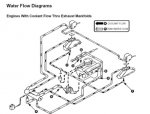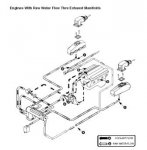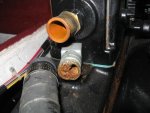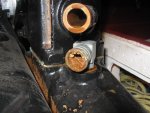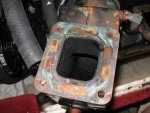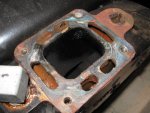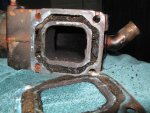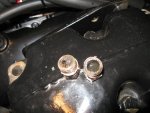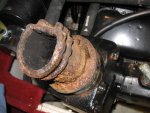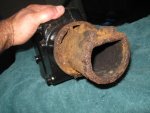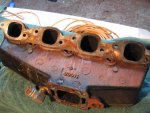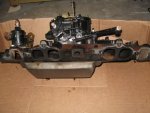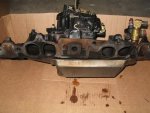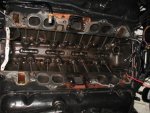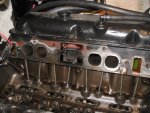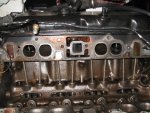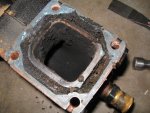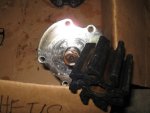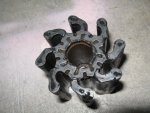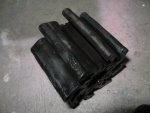Darin Jordan
Petty Officer 3rd Class
- Joined
- Aug 18, 2009
- Messages
- 75
Good Day.
First, let me preface this post by saying that I'm a good mechanic and have quite a bit of experience with motors of all kinds... so I'm not completely clueless about mechanical issues on motors. I just don't have a lot of experience with marine exhaust systems or issues that may arrise.
Here is what I'm dealing with.
After pulling my 1990 Maxum 2400SCR w/ Mercruiser 7.4L and Bravo 1 out of storage, I found that the antifreeze in the closed system was quite low. The boat was put away after flushing the fresh water side, and was stored with a heater in the engine compartment to keep the moisture down and keep it warm in colder weather. I live in Washington State, and we did have a colder winter, but nothing super severe.
Upon further inspection, I found that antifreeze in cylinders 3, 5, 6, and 8. 8 had enough in to prevent the starter from turning the motor over.
With the plugs out, the motor turns over fine with the starter. There is NO oil in the cooling system, and no water in the oil.
I've owned the boat for about 5-years, when I purchased it from my Mom after my Father died. He had owned it since it was new.
Since I've owned it, the anti-freeze has needed to be topped up after sitting for longer periods, and when running the boat, there would be some of the white anti-freeze fog coming out of the exhaust when you'd first fire it up when warm, but the plugs have always been just golden brown, with no sign of the motor actually burning the coolant...
According to the owners manual, the heat riser gaskets are suppose to be replaced every season. To my knowledge, they've NEVER been replaced...
I suspect that the prolonged storage this time just exaserbated an issue with leaking heat risers allowing antifreeze to get into the exhaust manifolds, which then ran down the manifolds and into the cylinders.
My current plan is to:
1) Spray SeaFoam into all the cylinders and down the intake to prevent any further possible damage from corrosion... Luckily it's almost pure antifreeze, so there shouldn't be much if any...
2) Change the motor oil to verify that no water is in the oilpan.
3) Do a compression test. Also watch for any signs that compression is getting into the oil system or cooling system (leak down test if necessary)
4) Reinstall the plugs and see how the motor runs.
If the motor is running smoothly and there are no signs that the heads or block is cracked, then I'm going to proceed by:
5) Removing the Heat Risers and if necessary the Exhaust manifolds and replace whatever appears to need replacing.
6) Change the oil again.
7) Put in new plugs and run the motor.
So, to all you experienced boat mechanics out there... does this sound like a reasonable approach? I know it could be something much worse (cracked/warped heads, etc.), but since the motor has been running fine, has NEVER been overheated or abused, and has been well cared for, I find it hard to believe that these worse-case scenarios would just happen while it's sitting... But, I'm open to advice...
Thanks!
First, let me preface this post by saying that I'm a good mechanic and have quite a bit of experience with motors of all kinds... so I'm not completely clueless about mechanical issues on motors. I just don't have a lot of experience with marine exhaust systems or issues that may arrise.
Here is what I'm dealing with.
After pulling my 1990 Maxum 2400SCR w/ Mercruiser 7.4L and Bravo 1 out of storage, I found that the antifreeze in the closed system was quite low. The boat was put away after flushing the fresh water side, and was stored with a heater in the engine compartment to keep the moisture down and keep it warm in colder weather. I live in Washington State, and we did have a colder winter, but nothing super severe.
Upon further inspection, I found that antifreeze in cylinders 3, 5, 6, and 8. 8 had enough in to prevent the starter from turning the motor over.
With the plugs out, the motor turns over fine with the starter. There is NO oil in the cooling system, and no water in the oil.
I've owned the boat for about 5-years, when I purchased it from my Mom after my Father died. He had owned it since it was new.
Since I've owned it, the anti-freeze has needed to be topped up after sitting for longer periods, and when running the boat, there would be some of the white anti-freeze fog coming out of the exhaust when you'd first fire it up when warm, but the plugs have always been just golden brown, with no sign of the motor actually burning the coolant...
According to the owners manual, the heat riser gaskets are suppose to be replaced every season. To my knowledge, they've NEVER been replaced...
I suspect that the prolonged storage this time just exaserbated an issue with leaking heat risers allowing antifreeze to get into the exhaust manifolds, which then ran down the manifolds and into the cylinders.
My current plan is to:
1) Spray SeaFoam into all the cylinders and down the intake to prevent any further possible damage from corrosion... Luckily it's almost pure antifreeze, so there shouldn't be much if any...
2) Change the motor oil to verify that no water is in the oilpan.
3) Do a compression test. Also watch for any signs that compression is getting into the oil system or cooling system (leak down test if necessary)
4) Reinstall the plugs and see how the motor runs.
If the motor is running smoothly and there are no signs that the heads or block is cracked, then I'm going to proceed by:
5) Removing the Heat Risers and if necessary the Exhaust manifolds and replace whatever appears to need replacing.
6) Change the oil again.
7) Put in new plugs and run the motor.
So, to all you experienced boat mechanics out there... does this sound like a reasonable approach? I know it could be something much worse (cracked/warped heads, etc.), but since the motor has been running fine, has NEVER been overheated or abused, and has been well cared for, I find it hard to believe that these worse-case scenarios would just happen while it's sitting... But, I'm open to advice...
Thanks!




















